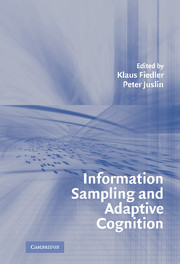Book contents
- Frontmatter
- Contents
- List of Contributors
- PART I INTRODUCTION
- PART II THE PSYCHOLOGICAL LAW OF LARGE NUMBERS
- PART III BIASED AND UNBIASED JUDGMENTS FROM BIASED SAMPLES
- 6 Subjective Validity Judgments as an Index of Sensitivity to Sampling Bias
- 7 An Analysis of Structural Availability Biases, and a Brief Study
- 8 Subjective Confidence and the Sampling of Knowledge
- 9 Contingency Learning and Biased Group Impressions
- 10 Mental Mechanisms: Speculations on Human Causal Learning and Reasoning
- PART IV WHAT INFORMATION CONTENTS ARE SAMPLED?
- PART V VICISSITUDES OF SAMPLING IN THE RESEARCHER'S MIND AND METHOD
- Index
- References
7 - An Analysis of Structural Availability Biases, and a Brief Study
Published online by Cambridge University Press: 02 February 2010
- Frontmatter
- Contents
- List of Contributors
- PART I INTRODUCTION
- PART II THE PSYCHOLOGICAL LAW OF LARGE NUMBERS
- PART III BIASED AND UNBIASED JUDGMENTS FROM BIASED SAMPLES
- 6 Subjective Validity Judgments as an Index of Sensitivity to Sampling Bias
- 7 An Analysis of Structural Availability Biases, and a Brief Study
- 8 Subjective Confidence and the Sampling of Knowledge
- 9 Contingency Learning and Biased Group Impressions
- 10 Mental Mechanisms: Speculations on Human Causal Learning and Reasoning
- PART IV WHAT INFORMATION CONTENTS ARE SAMPLED?
- PART V VICISSITUDES OF SAMPLING IN THE RESEARCHER'S MIND AND METHOD
- Index
- References
Summary
Benjamin Franklin once stated that “experience is a dear teacher” (in Poor Richard's Almanac, 1757/1793). I have often heard that misquoted as, “Experience is the best teacher.” Clearly, however, Franklin meant something other than “good” or “best” by the word “dear,” because he finished the thought with “and fools will learn from no other.”
What experience provides is a sample of instances. Those who maintain that we are very good at learning from experience are correct in that experience with a sample teaches us about the characteristics of the sample and a population if the sample is “representative” of it (assured, for example, by random sampling). For example, we are superb at producing intuitive estimates of frequencies and relative frequencies in a sample of materials to which we are actually exposed. (See Anderson and Schooler, 1991.) A problem arises, however, when a population about which we wish to generalize or learn is systematically different from the sample available to us. This systematic difference may provide a structural availability bias in that however accurate we may be about summarizing characteristics of our sample, we may fail to realize that it does not provide a good basis for making inferences that are important to us. Here, indeed, experience may be “dear” in the sense of “expensive.” (Generally, the literature on availability biases involves those of selective memory or estimation based on subjective judgments of the ease of recall – often due to vividness of particular instances – but that type of availability bias is not the topic of this chapter.
- Type
- Chapter
- Information
- Information Sampling and Adaptive Cognition , pp. 147 - 152Publisher: Cambridge University PressPrint publication year: 2005



